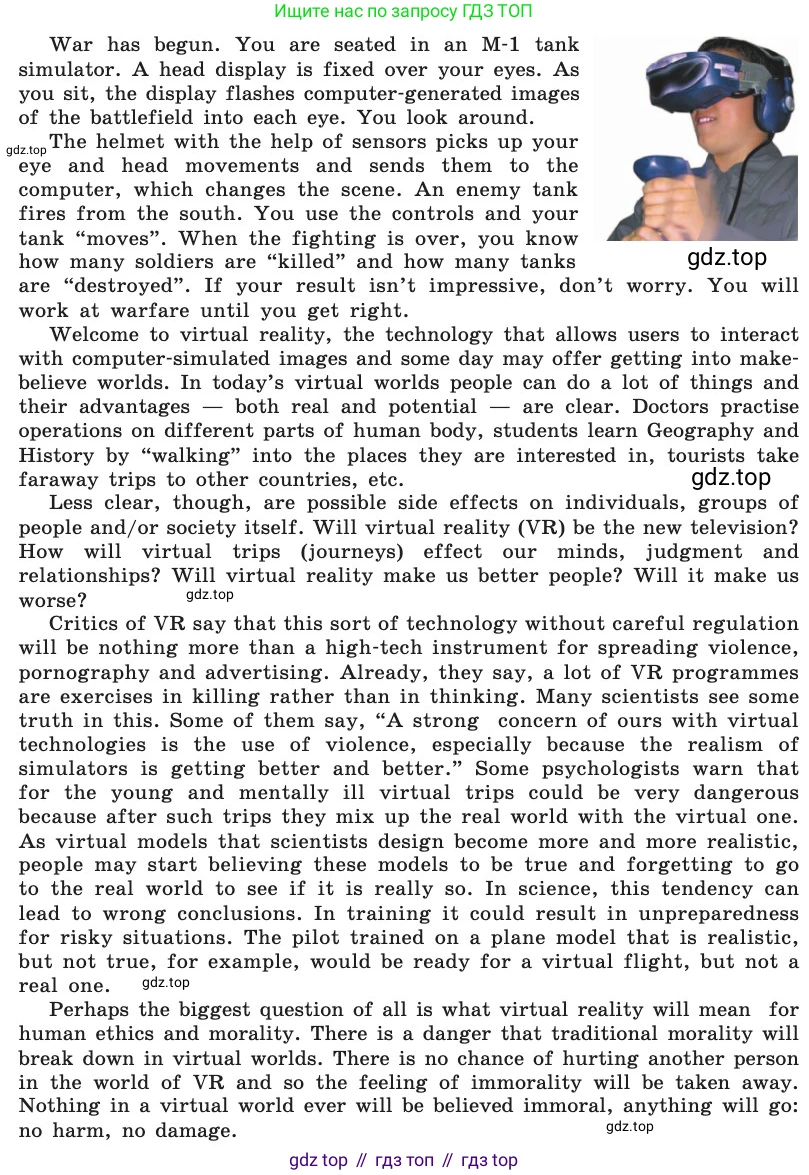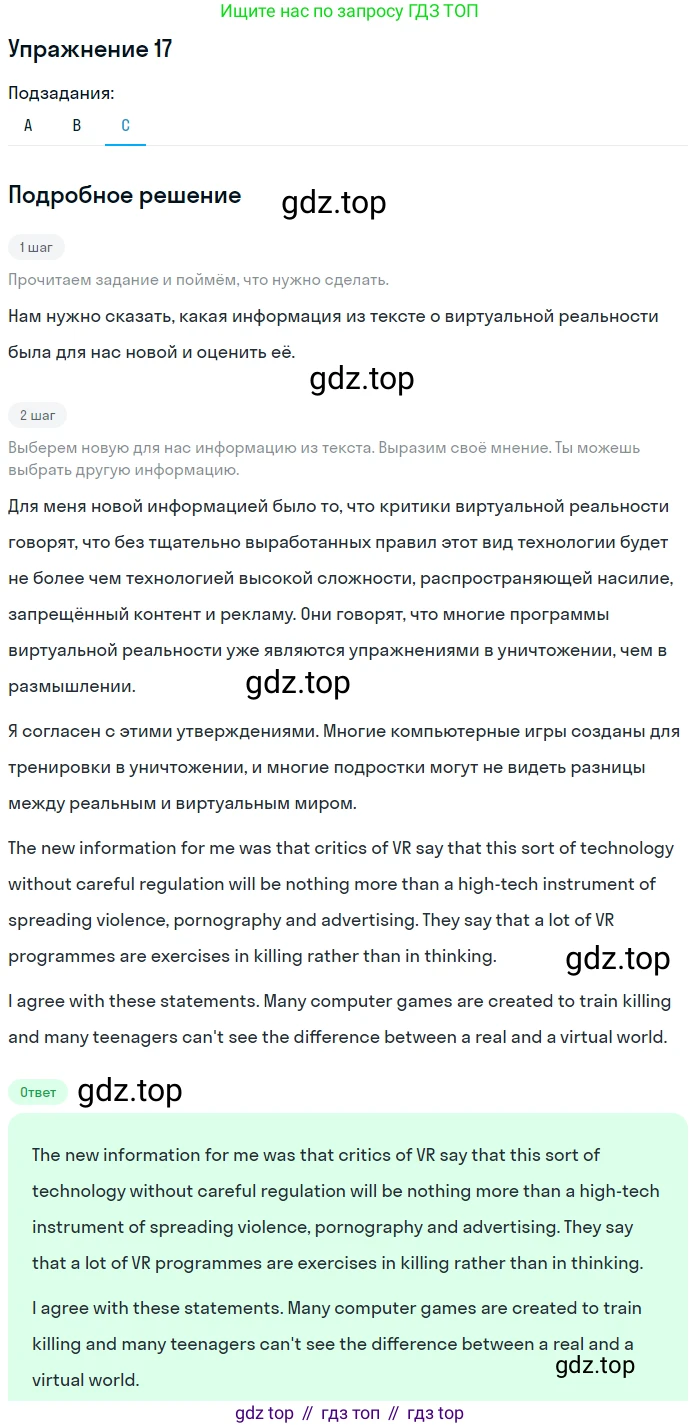Номер 17, страница 133 - гдз по английскому языку 8 класс учебник Афанасьева, Михеева

Авторы: Афанасьева О. В., Михеева И. В.
Тип: Учебник
Издательство: Просвещение
Год издания: 2014 - 2025
Уровень обучения: углублённый
Цвет обложки: белый
ISBN: 978-5-09-034201-8
Допущено Министерством просвещения Российской Федерации
Популярные ГДЗ в 8 классе
Unit 4. Fascination and Challenge: The World of Science and Technology. Reading for Information: «Virtual Reality: Danger Ahead?» - номер 17, страница 133.
№17 (с. 133)
Условие. №17 (с. 133)
скриншот условия



READING FOR INFORMATION
17 A. Read the title of the text. What do you think it may be about?
B. Read the text once and answer these questions. Was your guess about the title right?
1. What kind of war is described at the beginning of the text?
2. What are the advantages of the new virtual technology?
3. Do we have answers to all questions connected with virtual reality?
4. What in virtual technologies may turn out to be dangerous: a) for their users generally, b) in science, c) in training?
5. What may happen to human ethics and morality as a result of using virtual technologies?
Virtual Reality: Danger Ahead?
Virtual reality is an environment in which computers create the effect of a world which seems almost completely real to the people in it.
War has begun. You are seated in an M-1 tank simulator. A head display is fixed over your eyes. As you sit, the display flashes computer-generated images of the battlefield into each eye. You look around.
The helmet with the help of sensors picks up your eye and head movements and sends them to the computer, which changes the scene. An enemy tank fires from the south. You use the controls and your tank “moves”. When the fighting is over, you know how many soldiers are “killed” and how many tanks are “destroyed”. If your result isn’t impressive, don’t worry. You will work at warfare until you get right.
Welcome to virtual reality, the technology that allows users to interact with computer-simulated images and some day may offer getting into make-believe worlds. In today’s virtual worlds people can do a lot of things and their advantages — both real and potential — are clear. Doctors practise operations on different parts of human body, students learn Geography and History by “walking” into the places they are interested in, tourists take faraway trips to other countries, etc.
Less clear, though, are possible side effects on individuals, groups of people and/or society itself. Will virtual reality (VR) be the new television? How will virtual trips (journeys) effect our minds, judgment and relationships? Will virtual reality make us better people? Will it make us worse?
Critics of VR say that this sort of technology without careful regulation will be nothing more than a high-tech instrument for spreading violence, pornography and advertising. Already, they say, a lot of VR programmes are exercises in killing rather than in thinking. Many scientists see some truth in this. Some of them say, “A strong concern of ours with virtual technologies is the use of violence, especially because the realism of simulators is getting better and better.” Some psychologists warn that for the young and mentally ill virtual trips could be very dangerous because after such trips they mix up the real world with the virtual one. As virtual models that scientists design become more and more realistic, people may start believing these models to be true and forgetting to go to the real world to see if it is really so. In science, this tendency can lead to wrong conclusions. In training it could result in unpreparedness for risky situations. The pilot trained on a plane model that is realistic, but not true, for example, would be ready for a virtual flight, but not a real one.
Perhaps the biggest question of all is what virtual reality will mean for human ethics and morality. There is a danger that traditional morality will break down in virtual worlds. There is no chance of hurting another person in the world of VR and so the feeling of immorality will be taken away. Nothing in a virtual world ever will be believed immoral, anything will go:
So, what is the final word on virtual reality? It can be a curse or a blessing. In the end this new technology will be what we make it.
C. Say what information offered in the text was new for you. How could you estimate it?
Решение. №17 (с. 133)



Решение 2. №17 (с. 133)
A. Прочтите заголовок текста. Как вы думаете, о чем он может быть?
B. Прочтите текст один раз и ответьте на эти вопросы. Было ли ваше предположение о заголовке верным?
1. Какой вид войны описан в начале текста?
2. Каковы преимущества новой виртуальной технологии?
3. Есть ли у нас ответы на все вопросы, связанные с виртуальной реальностью?
4. В чем виртуальные технологии могут оказаться опасными: a) для пользователей в целом, b) в науке, c) в обучении?
5. Что может случиться с человеческой этикой и моралью в результате использования виртуальных технологий?
C. Скажите, какая информация, предложенная в тексте, была для вас новой. Как бы вы могли ее оценить?
Ответ:
A. I think the text will be about virtual reality and its potential dangers or negative aspects. / Я думаю, что текст будет о виртуальной реальности и ее потенциальных опасностях или негативных сторонах.
B. Yes, my guess was right. The text discusses both the advantages and the potential dangers of virtual reality. / Да, моя догадка была верна. В тексте обсуждаются как преимущества, так и потенциальные опасности виртуальной реальности.
1. A simulated war in an M-1 tank simulator is described at the beginning of the text. / В начале текста описывается симуляция войны в танковом симуляторе M-1.
2. The advantages are that virtual technology can be used for training and education. For example, doctors can practise operations, students can learn Geography and History by "walking" into places, and tourists can take virtual trips. / Преимущества в том, что виртуальные технологии можно использовать для обучения и образования. Например, врачи могут практиковаться в проведении операций, студенты могут изучать географию и историю, "прогуливаясь" по разным местам, а туристы могут совершать виртуальные путешествия.
3. No, we do not have answers to all questions connected with virtual reality. The text suggests that its future and effects on people and society are still unclear. / Нет, у нас нет ответов на все вопросы, связанные с виртуальной реальностью. Текст предполагает, что ее будущее и влияние на людей и общество все еще неясны.
4.
a) For users generally, it can be dangerous because it can be used to spread violence and pornography. It can also be dangerous for young and mentally ill people who might mix up the real world with the virtual one. / a) Для пользователей в целом, она может быть опасна, так как может использоваться для распространения насилия и порнографии. Также она может быть опасна для молодых и психически нездоровых людей, которые могут перепутать реальный мир с виртуальным.
b) In science, there is a danger that people might start believing realistic models to be true without checking them against the real world, which can lead to wrong conclusions. / b) В науке существует опасность, что люди могут начать верить в реалистичность моделей, не сверяя их с реальным миром, что может привести к неверным выводам.
c) In training, it could result in unpreparedness for real-life risky situations. For example, a pilot trained only on a simulator might not be ready for a real flight. / c) В обучении это может привести к неподготовленности к реальным рискованным ситуациям. Например, пилот, обученный только на симуляторе, может быть не готов к настоящему полету.
5. There is a danger that traditional morality will break down. In virtual worlds, there are no real consequences for immoral actions, so the feeling of immorality might be taken away and people may believe that "anything goes". / Существует опасность, что традиционная мораль разрушится. В виртуальных мирах нет реальных последствий для аморальных поступков, поэтому чувство аморальности может исчезнуть, и люди могут поверить, что "все дозволено".
C. For me, the new information was that VR training could actually lead to unpreparedness for real-life situations. I always thought simulations were only helpful. I think this is a very important warning, and it's something developers and educators should think about. / Для меня новой информацией было то, что обучение в VR может привести к неподготовленности к реальным ситуациям. Я всегда думал, что симуляции только помогают. Я считаю, что это очень важное предостережение, и это то, о чем должны задуматься разработчики и преподаватели.
Другие задания:
Помогло решение? Оставьте отзыв в комментариях ниже.
Присоединяйтесь к Телеграм-группе @top_gdz
ПрисоединитьсяМы подготовили для вас ответ c подробным объяснением домашего задания по английскому языку за 8 класс, для упражнения номер 17 расположенного на странице 133 к учебнику 2014 года издания для учащихся школ и гимназий.
Теперь на нашем сайте ГДЗ.ТОП вы всегда легко и бесплатно найдёте условие с правильным ответом на вопрос «Как решить ДЗ» и «Как сделать» задание по английскому языку к упражнению №17 (с. 133), авторов: Афанасьева (Ольга Васильевна), Михеева (Ирина Владимировна), углублённый уровень обучения учебного пособия издательства Просвещение.
















